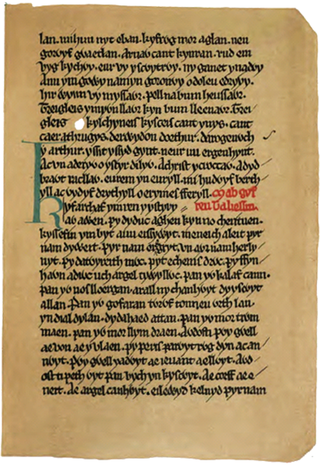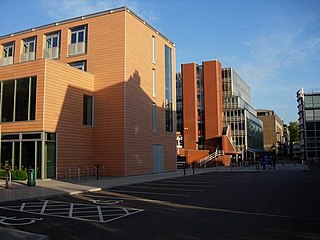Lleu Llaw Gyffes is a hero of Welsh mythology. He appears most prominently in the Fourth Branch of the Mabinogi, the tale of Math fab Mathonwy, which tells the tale of his birth, his marriage, his death, his resurrection and his accession to the throne of Gwynedd. He is a warrior and magician, invariably associated with his uncle Gwydion.
Ceridwen or Cerridwen was an enchantress in Welsh medieval legend. She was the mother of a hideous son, Afagddu, and a beautiful daughter, Creirwy. Her husband was Tegid Foel and they lived near Bala Lake in north Wales. Medieval Welsh poetry refers to her as possessing the cauldron of poetic inspiration (Awen) and the Tale of Taliesin recounts her swallowing her servant Gwion Bach who is then reborn through her as the poet Taliesin. Ceridwen is regarded by many modern pagans as the Celtic goddess of rebirth, transformation, and inspiration.
Taliesin was an early Brittonic poet of Sub-Roman Britain whose work has possibly survived in a Middle Welsh manuscript, the Book of Taliesin. Taliesin was a renowned bard who is believed to have sung at the courts of at least three kings.

The Mabinogion are the earliest Welsh prose stories, and belong to the Matter of Britain. The stories were compiled in Middle Welsh in the 12th–13th centuries from earlier oral traditions. There are two main source manuscripts, created c. 1350–1410, as well as a few earlier fragments. The title covers a collection of eleven prose stories of widely different types, offering drama, philosophy, romance, tragedy, fantasy and humour, and created by various narrators over time. There is a classic hero quest, "Culhwch and Olwen"; a historic legend in "Lludd and Llefelys," complete with glimpses of a far off age; and other tales portray a very different King Arthur from the later popular versions. The highly sophisticated complexity of the Four Branches of the Mabinogi defies categorisation. The stories are so diverse that it has been argued that they are not even a true collection.

The Annales Cambriae is the title given to a complex of Latin chronicles compiled or derived from diverse sources at St David's in Dyfed, Wales. The earliest is a 12th-century presumed copy of a mid-10th-century original; later editions were compiled in the 13th century. Despite the name, the Annales Cambriae record not only events in Wales, but also events in Ireland, Cornwall, England, Scotland and sometimes further afield, though the focus of the events recorded especially in the later two-thirds of the text is Wales.
The English Place-Name Society (EPNS) is a learned society concerned with toponomastics and the toponymy of England, in other words, the study of place-names (toponyms).

The National Library of Wales, Aberystwyth, is the national legal deposit library of Wales and is one of the Welsh Government sponsored bodies. It is the biggest library in Wales, holding over 6.5 million books and periodicals, and the largest collections of archives, portraits, maps and photographic images in Wales. The Library is also home to the national collection of Welsh manuscripts, the National Screen and Sound Archive of Wales, and the most comprehensive collection of paintings and topographical prints in Wales. As the primary research library and archive in Wales and one of the largest research libraries in the United Kingdom, the National Library is a member of Research Libraries UK (RLUK) and the Consortium of European Research Libraries (CERL).

Walter William Skeat, was a British philologist and Anglican deacon. The pre-eminent British philologist of his time, he was instrumental in developing the English language as a higher education subject in the United Kingdom.

Edward Williams, better known by his bardic name Iolo Morganwg, was a Welsh antiquarian, poet and collector. He was seen as an expert collector of Medieval Welsh literature, but it emerged after his death that he had forged several manuscripts, notably some of the Third Series of Welsh Triads. Even so, he had a lasting impact on Welsh culture, notably in founding the secret society known as the Gorsedd, through which Iolo Morganwg successfully co-opted the 18th-century Eisteddfod revival. The philosophy he spread in his forgeries has had an enormous impact upon neo-Druidism. His bardic name is Welsh for "Iolo of Glamorgan".

The Book of Taliesin is one of the most famous of Middle Welsh manuscripts, dating from the first half of the 14th century though many of the fifty-six poems it preserves are taken to originate in the 10th century or before.
Medieval Welsh literature is the literature written in the Welsh language during the Middle Ages. This includes material starting from the 5th century AD, when Welsh was in the process of becoming distinct from Common Brittonic, and continuing to the works of the 16th century.

Celtic studies or Celtology is the academic discipline occupied with the study of any sort of cultural output relating to the Celtic-speaking peoples. This ranges from linguistics, literature and art history, archaeology and history, the focus lying on the study of the various Celtic languages, living and extinct. The primary areas of focus are the six Celtic languages currently in use: Irish, Scottish Gaelic, Manx, Welsh, Cornish, and Breton.

John Matthews and Caitlín Matthews are English writers. Together, they have written over 150 books and translated into more than thirty languages. Their work also includes Tarot packs, a card-based storytelling system, screenplays, and songs.
Nollaig Ó Muraíle is an Irish scholar. He published an acclaimed edition of Dubhaltach Mac Fhirbhisigh's Leabhar na nGenealach in 2004. He was admitted to the Royal Irish Academy in 2009.

The Chronicles and Memorials of Great Britain and Ireland during the Middle Ages, widely known as the Rolls Series, is a major collection of British and Irish historical materials and primary sources published as 99 works in 253 volumes between 1858 and 1911. Almost all the great medieval English chronicles were included: most existing editions, published by scholars of the 17th and 18th centuries, were considered to be unsatisfactory. The scope was also extended to include legendary, folklore and hagiographical materials, and archival records and legal tracts. The series was government-funded, and takes its unofficial name from the fact that its volumes were published "by the authority of Her Majesty's Treasury, under the direction of the Master of the Rolls", who was the official custodian of the records of the Court of Chancery and other courts, and nominal head of the Public Record Office.
Oliver James Padel is an English medievalist and toponymist specializing in Welsh and Cornish studies. He is currently Honorary Research Fellow in the Department of Anglo-Saxon, Norse, and Celtic in the University of Cambridge. and Visiting Professor of Celtic at the University of the West of England
Gilla in Chomded húa Cormaic was a Gaelic-Irish poet of the early Middle Ages, fl. c. 1150 - c.1170.
John T. Koch is an American academic, historian and linguist who specializes in Celtic studies, especially prehistory and the early Middle Ages. He is the editor of the five-volume Celtic Culture. A Historical Encyclopedia. He is perhaps best known as the leading proponent of the Celtic from the West hypothesis.

The Department of Anglo-Saxon, Norse and Celtic is one of the constituent departments of the University of Cambridge, and focuses on the history, material culture, languages and literatures of the various peoples who inhabited Britain, Ireland and the extended Scandinavian world in the early Middle Ages. It is based on the second floor of the Faculty of English at 9 West Road. In Cambridge University jargon, its students are called ASNaCs.
Jan Ziolkowski occupies the Arthur Kingsley Porter Professorship of Medieval Latin at Harvard University. From 2007 to 2020 he served as Director of the Dumbarton Oaks Research Library and Collection. His scholarship has focused on the literature, especially in Latin, of the Middle Ages.









